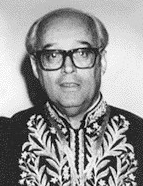

He was also Director of the National Archives in Rio de Janeiro (from 1958 to 1964), lecturer at the Escola Superior de Guerra [War College] (from 1957 to 1964), and executive secretary of the Instituto Brasileiro de Relações Internacionais [Brazilian Institute of International Relations] (between 1964 and 1968, when he also directed the Revista Brasileira de Estudos Internacionais [Brazilian Journal of International Studies]). Between the 1930s and 1960s, he wrote a large number of articles published in newspapers and journals such as Jornal do Brasil, Época, Idéia, Revista do Brasil, O Jornal, Nova Atlântida, Jornal do Comércio, Diário de Notícias, Correio da Manhã, Tribuna da Imprensa (all based in Rio de Janeiro), Diário de São Paulo, Estado de Minas, Diário do Paraná, Diário de Pernambuco, and Tribuna de Petrópolis.
José Honório Rodrigues' first publication—the article "A civilização holandesa no Brasil" [Dutch civilisation in Brazil], in Jornal do Brasil of 19 June 1936—it boldly underscored one of his defining characteristics as a historian: a vision of Brazil transcending its own borders, here also concentrating on the history of the 17th century Netherlands. This publication prepared the ground for the work that would be awarded a prize by the Brazilian Academy of Letters in 1937, as well as for his first book, released three years afterwards. In it, although the author mentions the lack of any "sense of a true colonial creation" on the part of the Dutch, who in Brazil were only interested in "looting" and "plundering"( Civilização holandesa no Brasil , p. 318), what we see immediately afterwards is the classic apology for the Dutch colonial enterprise, seen as more positive, civilised, urban and refined than the Portuguese, who were rural, backward and crude. A second hallmark of Rodrigues' production was an evolutionary conception of history, which often led to phenomena being evaluated according to a scale of positivity established beforehand. A third trait of his work that would become ever-present was his concern with the primary sources and research conditions surrounding Brazilian history, evident in the annotated indexes of the Revista do Instituto do Ceará [Journal of the Institute of Ceará] (Fortaleza, Imprensa Universitária do Ceará, 1961) and the Revista do Instituto Arqueológico, Histórico e Geográfico de Pernambuco [Journal of the Archaeological, Historical and Geographical Institute of Pernambuco] (Recife, 1961), in various editions of historical documents and catalogues, in Historiografia e bibliografia do domínio holandês no Brasil [Historiography and bibliography of Dutch rule in Brazil] (1949), and, ultimately, in what would likely be his most significant contribution: Teoria da história do Brasil [Theory of the history of Brazil] (1949). The following year, this line of work continued with the publication of Fontes da História do Brasil na Europa [Sources of Brazilian History in Europe] (Rio de Janeiro, Imprensa Nacional, 1950) and another book that proved to be very influential: A pesquisa histórica no Brasil: sua evolução e problemas atuais [Historical research in Brazil: its evolution and current issues] (1952). Two years later, he organised and prefaced the publication of Capistrano de Abreu's correspondence (Rio de Janeiro, Ministry of Education and Culture/National Book Institute, 1954) and signed a work on regional history, O continente do Rio Grande [The Rio Grande continent] (Rio de Janeiro, Edições São José, 1954). At the same time as his works were circulating more and more in Brazil, Rodrigues had parts of them published in Mexico in two volumes translated into Spanish, both by the Pan-American Institute of Geography and History: Historiografia del Brasil. Siglo XVI [Historiography of Brazil. 16th century] (1957), and Historiografia del Brasil. Siglo XVII [Historiography of Brazil. 17th century] (1963).
This work is financed by national funds through FCT - Foundation for Science and Technology, I.P, in the scope of the projects UIDB/04311/2020 and UIDP/04311/2020.
